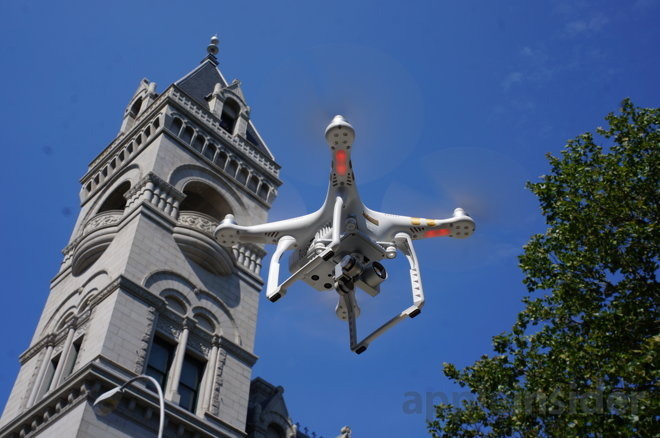A U.S. Federal Aviation Administration task force has issued a set of recommendations for registering unmanned drones, looking to manage the increasingly popular technology.
For drones between 250 grams and 55 pounds, owners would only need to register the names and addresses of the pilots, instead of each individual drone, according to the task force's official report. Submitting things like email addresses, phone numbers and serial numbers would be purely optional. People choosing not to submit serial numbers, though, would have to mark their registration numbers somewhere on their devices that can be accessed without tools.
Owners would also have to be at least 13 years old, but a parent or guardian could register on behalf of younger individuals.
Another critical suggestion was that registration be free and handled via the Web, with owners getting a digital certificate unless they specifically ask for a paper copy. There would be no flight tests or training, though people might have to sign off on some safety and flying education.
The report was more ambiguous about penalties for unregistered drones, though the task force suggested they be "clear and proportionate" — avoiding the potentially severe punishments associated with full-sized aircraft.
Drones are now flown not only by the military but a growing number of other groups, ranging from hobbyists and filmmakers to rescue teams. Businesses like Amazon are exploring the idea of using drones for small deliveries, which could potentially see swarms of the devices flying over major cities.
A concern has been that without regulation, there could be serious problems with things like crashes, security and privacy concerns, and noise pollution.
 Roger Fingas
Roger Fingas








 Marko Zivkovic
Marko Zivkovic
 Christine McKee
Christine McKee
 Andrew Orr
Andrew Orr
 Andrew O'Hara
Andrew O'Hara
 William Gallagher
William Gallagher

 Mike Wuerthele
Mike Wuerthele
 Bon Adamson
Bon Adamson




-m.jpg)



36 Comments
All I want is to *legally* fly a drone and get paid for it. It used to be that you could fly for "fun" but not for "commercial use" I want to shoot drone video for real estate purposes.
This topic is going to get nasty.
But please remember they are flying plastic toys.
All I want is to *legally* fly a drone and get paid for it.
It used to be that you could fly for "fun" but not for "commercial use"
I want to shoot drone video for real estate purposes.
Unless the real estate is too close to an airport it should be pretty straightforward once they set the regs.
[quote name="sog35" url="/t/190317/faa-recommends-registering-drone-pilots-instead-of-individual-drones#post_2809900"] dont worry about it. The chances of getting cited for not having a drone license is nill [/quote] Oh sure. I'm not that worried about it. I don't even have a drone yet. But it's on my radar since I have a bunch of friends in real estate and they're asking about it. I just wish the FAA would make a decision. I never really understood the difference between flying for "fun" and "commercial use" anyway. It can't be safety reasons... a drone could injure someone in either case. It's more likely that someone who is being paid to fly would be *extra* careful.
I just wish the FAA would make a decision. I never really understood the difference between flying for "fun" and "commercial use" anyway.
It can't be safety reasons... a drone could injure someone in either case. It's more likely that someone who is being paid to fly would be *extra* careful.
A lot of regulations differentiate between commercial activity and "fun": look at pilots licenses for example to stay in the realm of aircraft. For a "fun" sailplane walk up with eyesight and a pulse and you're more or less good to go: ask about a license to fly a 747 full of paying passengers, well, let's say it's a more involved process..... Boats and the Coast Guard are the same way: your own boat is fine, accept paying passengers and the regulations come out to play.
ETA: And as mentioned below recreational activity is often far less frequent than activity someone is doing as a commercial enterprise. So the opportunity for some sort of incident just goes up as the flying time goes up...